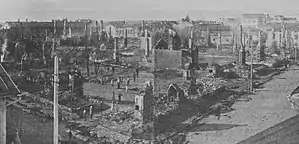July 1916
| << | July 1916 | >> | ||||
|---|---|---|---|---|---|---|
| Su | Mo | Tu | We | Th | Fr | Sa |
| 1 | ||||||
| 2 | 3 | 4 | 5 | 6 | 7 | 8 |
| 9 | 10 | 11 | 12 | 13 | 14 | 15 |
| 16 | 17 | 18 | 19 | 20 | 21 | 22 |
| 23 | 24 | 25 | 26 | 27 | 28 | 29 |
| 30 | 31 | |||||
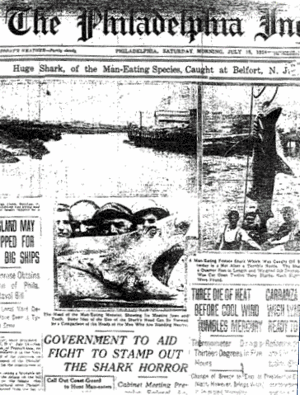
The Philadelphia Inquirer reporting the capture of a "man-eating" shark supposedly responsible for several attacks along the New Jersey coast in July.
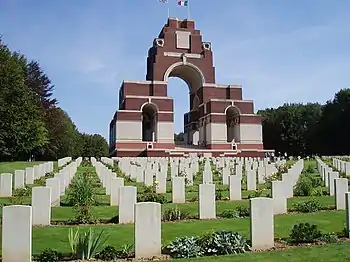
Thiepval Memorial to the British soldiers missing during the Battle of the Somme.
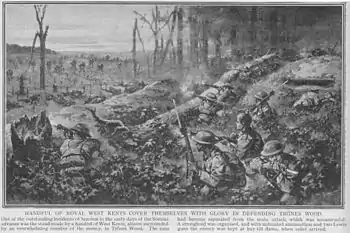
The fight for Trônes Wood, 8–14 July
The following events occurred in July 1916:
July 1, 1916 (Saturday)
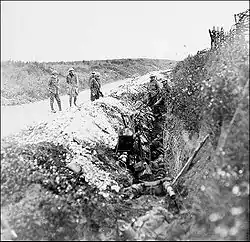
Newfoundland soldiers waiting in St. John's Road support trench
_2.jpg.webp)
The explosion of the mine under Hawthorn Ridge Redoubt, 1 July 1916 (Photo 2 by Ernest Brooks)
- Battle of the Somme – The biggest battle of World War I opened with the Battle of Albert, with British forces capturing the French communes of Gommecourt, Mountauban and Mamtez on the same day.[1][2][3] The opening offense was the British Army's bloodiest day, with 57,470 British casualties including 19,240 killed. German casualties for that day were significantly lower at c. 12,000 men.[4] Some of the noted casualties included:
- The 36th Ulster Division, which contained many Ulster Volunteers, lost 5,500 men during the first two days of fighting.[5]
- The Royal Newfoundland Regiment with the Dominion of Newfoundland sustained a 90 percent casualty rate while attacking Hawthorn Ridge, with 68 men out of 801 reporting for roll call the day after[6] and 26% of all the Dominion's troops killed in the entire war falling on this day.
- Nine Victoria Crosses were awarded, two-thirds posthumously, for brave action during the first date of the battle, which included Eric Bell, Geoffrey Cather, John Leslie Green, Stewart Loudoun-Shand, William McFadzean, Robert Quigg, Walter Potter Ritchie, George Sanders, and James Youll Turnbull.[7]
- A high number of noted British poets were among the casualties during the first day of fighting, including W. N. Hodgson, Will Streets, Gilbert Waterhouse, Henry Field, Alfred Ratcliffe, Alexander Robertson and Bernard White.[8] Some other noted casualties included cricketer Major Booth[9] and association football player Evelyn Lintott.[10]
- A total 19 mines dug and filled with explosives were ignited underneath German front lines at the start of the Battle of the Somme, resulting in one of the largest man-made explosions at the time that was rumored to be heard as far as London.[11]
- The Social Democratic Party of Finland won a majority in the parliament of the Russian-ruled Grand Duchy of Finland.[12][13]
- At least one shark attacked five swimmers over the course of two weeks along 80 miles (130 km) of New Jersey coastline, resulting in four deaths and the survival of one youth who required limb amputation. The event inspired author Peter Benchley, over half a century later, to write the thriller novel Jaws.[14]
- Prohibition of alcohol was introduced in Alberta under the binding results of a liquor plebiscite in 1915.[15]
- The United States Army activated the 17th Cavalry Regiment in Fort Bliss, Texas to protect the United States-Mexico border.[16]
- The Zoological Survey of India was established to survey, explore and research the fauna in the Indian region.[17]
- W. B. Yeats made his fifth and final proposal of marriage to the newly widowed Maud Gonne in France. Gonne had been married to Irish Republican leader John MacBride, who was executed in May by British forces for his role in the Easter Rising.[18]
- The municipality of Bremnes, Norway was established and would exist until 1963 when it merged with the municipality of Bømlo.[19]
- Auto-Owners Insurance was established in Mount Pleasant, Michigan but moved to Lansing, Michigan a year later.[20]
- Born: Olivia de Havilland, British-American actress, best known for her leading roles in The Adventures of Robin Hood and Gone with the Wind, winner of the Academy Award for Best Actress for To Each His Own and The Heiress, in Tokyo (d. 2020); Lawrence Halprin, American architect, best known for his design work for the grounds at Ghirardelli Square in San Francisco and the Century 21 Exposition in Seattle, in New York City (d. 2009); Bob Prince, American sportscaster, best known for sports commentary for the Pittsburgh Pirates, in Los Angeles (d. 1985)
- Born: Iosif Shklovsky, Ukrainian astrophysicist, best known for his theory and search for extraterrestrial life, co-author of Intelligent Life in the Universe with Carl Sagan in Hlukhiv, Ukraine (then part of the Russian Empire) (d. 1985); Robert Stanford Tuck, British air force officer, commander of the 257 Squadron during World War II, recipient of the Distinguished Service Order and Distinguished Flying Cross, in Catford, London, England (d. 1987)
July 2, 1916 (Sunday)
- Battle of Albert – British forces captured the village of Fricourt along with 1,625 German prisoners, but at a cost of 8,791 casualties over 48 hours.[21][22][23]
- Battle of Erzincan – Russian forces under command of Nikolai Yudenich launched counterattacks against the Ottoman Third Army at Erzincan in what is now Turkey.[24]
- Baranovichi Offensive – Three corps with the Russian 4th Army attempted the first of four attacks against Central Powers around Baranovichi in what is now Belarus, but saw the offense stall by the second day.[25]
- Born: Ken Curtis, American actor, best known for the role of Festus Haggen in the long-running TV Western Gunsmoke, in Lamar, Colorado (d. 1991); Barry Gray, American radio broadcaster, considered the "Father of Talk Radio", in Red Lion, New Jersey (d. 1996); Hans-Ulrich Rudel, German fighter pilot, member of the Luftwaffe during World War II with over 800 confirmed destroyed enemy vehicles and weapons, recipient of the Knight's Cross of the Iron Cross, in Konradswaldau, German Empire (now Poland) (d. 1982)
July 3, 1916 (Monday)
- Battle of Albert – British forces captured parts of La Boisselle and Ovillers from the Germans.[26]
- Battle of Guayacanas – The United States Marine Corps defeated Dominican troops and captured Santiago de los Caballeros in the Dominican Republic.[27]
- Born: John Kundla, American basketball coach, coached for Minneapolis Lakers from 1947 to 1960 before the team moved and became the Los Angeles Lakers, and Minnesota Golden Gophers men's basketball team from 1959 to 1968, in Star Junction, Pennsylvania (d. 2017)
- Died: Hetty Green, American financier, nicknamed "Witch of Wall Street" for both her financial successes in real estate, railroad investments and loans, as well as her legendary miserliness that earned her an entry in the Guinness Book of World Records (b. 1834); Alfred Kleiner, Swiss physicist, doctoral adviser of Albert Einstein (b. 1849)
July 4, 1916 (Tuesday)
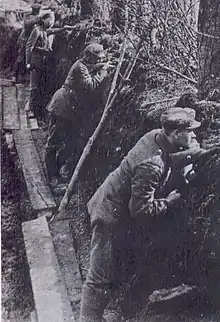
Entrenched Polish troops at the Battle of Kostiuchnówka
- Battle of Mecca – The last resisting Ottoman garrison in Mecca surrendered to Arab forces after three weeks of fighting.[28]
- Battle of Kostiuchnówka – The Imperial Russian Army and Polish Legions allied with the Austria-Hungary clashed at the village of Kostiuchnówka in Galicia (now Ukraine).[29]
- McCormick's Creek State Park was established in Owen County, Indiana.[30]
- According to legend, the first Nathan's Hot Dog Eating Contest was held at Natan's Famous original location on Coney Island with four competitors (the winners of the contest varied from differing accounts).[31]
- Born: Daniel Webster Cluff, American naval officer, best known for leading the daring SS Pendleton and SS Fort Mercer rescues in the 1950s, in Chincoteague, Virginia (d. 1989); George Hunt, British naval officer, commander of the British submarine HMS Ultor which sank the most enemy vessels during World War II, recipient of the Distinguished Service Order, in Milton of Campsie, Scotland (d. 2011)
- Born: Iva Toguri D'Aquino, American radio broadcaster, known as Japanese propaganda broadcaster "Tokyo Rose" during World War II, in Los Angeles (d. 2006); Naseem Banu, Indian film actress, best known for lead roles in Khoon Ka Khoon and Pukar, in Delhi (d. 2002)
- Died: Alan Seeger, American poet and soldier, uncle to folk singer Pete Seeger, killed at the Battle of the Somme (b. 1888)
July 5, 1916 (Wednesday)
- A hurricane in the Gulf of Mexico killed 34 people and caused $3 million in crop and property damage for Florida, Alabama, Mississippi, and Tennessee.[32]
- Shinano Railway extended the Ōito Line in the Nagano Prefecture, Japan, with station Shinano-Ōmachi serving the line.[33]
- Born: Ivor Powell, Welsh association football player and manager, played for the Queens Park Rangers from 1937 to 1948 and the Wales national football team from 1946 to 1950, manager for various clubs including Carlisle United, in Bargoed, Wales (d. 2012)
July 6, 1916 (Thursday)
- Battle of Albert – The British had complete control over La Boisselle, but at loss of 9,850 casualties.[34]
- Battle of Kostiuchnówka – Russian broke through the line, forcing the Polish Legions and supporting Hungarian troops to retreat, with the Poles enduring 2,000 casualties.[35]
- British submarine HMS E26 was lost in the North Sea with all 30 crew.[36]
- The United States Army activated the 33rd Infantry Regiment to protect the Panama Canal.[37]
- Died: Odilon Redon, French painter, member of the Symbolism movement, recipient of the Legion of Honour (b. 1840)
July 7, 1916 (Friday)
- German submarine SM U-77 disappeared while on a mining mission in the North Sea. It was likely she sank after an accident with all 33 crew lost.[38]
- The New Zealand Labour Party was founded in Wellington.[39]
- The World Socialist Party of the United States was established by defecting members of the Detroit chapter of the Socialist Party of America.[40]
- Born: Steve "Pablo" Davis, American artist, member of the Diego Rivera team that produce the Detroit Industry mural, in Philadelphia (d. 2013); Herbert Täschner, German politician, General Secretary of the Liberal Democratic Party of Germany in East Germany from 1950 to 1954, in Dresden (d. 1984); Joe Robbie, American sports executive, first owner of the Miami Dolphins, in Sisseton, South Dakota (d. 1990)
- Died: Dick Thomas, Welsh rugby player, played back for Glamorgan from 1904 to 1914 and the Wales national rugby union team from 1906 to 1909 (killed at the Battle of the Somme) (b. 1883)
July 8, 1916 (Saturday)
- Baranovichi Offensive – After two previous stalls, the Russian Fourth Army launched a third attack against the Germans under cover the night but were repulsed.[41]
- Russian hospital ship Vpered was torpedoed by German sub SM U-38 in the Black Sea, killed seven people.[42]
- Born: Jean Rouverol, American screenwriter, blacklisted in the 1950s, screenwriter for The Legend of Lylah Clare, in St. Louis (d. 2017)
- Died: Augustin Cochin, French historian, major author on the French Revolution, killed in action during the Battle of the Somme (b. 1876); Edwin Henry Egerton, British diplomat, ambassador to Greece, Spain and Italy from 1892 to 1908 (b. 1841)
July 9, 1916 (Sunday)
- Battle of Verdun – The Germans began their assault of Fort Souville southeast of the Fleury-devant-Douaumont commune using gas, French soldiers with new gas masks that prevented numerous gas-related casualties.[43][44]
- Arab Revolt – Arab forces loyal to Hussein bin Ali took control of the holy city of Mecca.[45]
- Argentine president Victorino de la Plaza was nearly assassinated during a military parade inspection on the centennial of Argentina's independence.[46]
- The governing sports organization CONMEBOL for all of South American association football was established on the centennial Independence Day for Argentina, under the initiative of Héctor Rivadavia Gómez, director of the Uruguayan Football Association.[47]
- Born: Edward Heath, British state leader, Prime Minister of the United Kingdom from 1970 to 1974, in Broadstairs, Kent, England (d. 2005); Elmer Bischoff, American artist, member of the Bay Area Figurative Movement in San Francisco, in Berkeley, California (d. 1991)
July 10, 1916 (Monday)
- Battle of Albert – British forces captured the French commune of Contalmaison at an estimated cost of 12,00 casualties compared to 4,000 lost on the German side.[48]
- Born: Hubert Ogunde Nigerian stage actor playwright, founder of Ogunde Theater, in Ogun State, Nigeria (d. 1990)
- Died: Denys Dobson, English rugby player, played for the England national rugby union team in 1902 to 1903 (b. 1880)
July 11, 1916 (Tuesday)
- Battle of Verdun – German infantry began a direct assault on Fort Souville in France.[44]
- U.S. President Woodrow Wilson signed the Federal Aid Road Act, which introduced the first federal funding to build interstate highways.[49]
- The village of Milk River, Alberta was established.[50]
- Born: Alexander Prokhorov, Australian-Russian physicist, recipient for the Nobel Prize in Physics for his pioneering research on lasers, in Atherton, Queensland, Australia (d. 2002); Reg Varney, English actor, best known for his television roles on The Rag Trade and On the Buses, in Canning Town, London, England (d. 2008); Kitty O'Brien Joyner, American engineer, first woman to work for NASA, in Charlottesville, Virginia (d. 1993)
- Born: Gough Whitlam, Australian state leader, 21st Prime Minister of Australia, in Melbourne (d. 2014); Mortimer Caplin, American lawyer, served as Commissioner of Internal Revenue under the John F. Kennedy administration, in New York City (d. 2019)
July 12, 1916 (Wednesday)
- Battle of Albert – The British captured Mametz Wood in France at a cost of c. 4,000 casualties..[51]
- Battle of Verdun – German soldiers reach the top of Fort Souville in France.[44]
- American cruiser USS North Carolina launched a Curtiss flying boat piloted by Lieutenant Godfrey Chevalier using a catapult, becoming the first ship to do so while underway.[52]
- Imperial Trans-Antarctic Expedition – A third attempt to rescue the main body of the stranded British polar expedition party on Elephant Island following the sinking of the polar ship Endurance was made by the British schooner Emma but the pack ice prevented the ship from nearing the island.[53]
- Cesare Battisti and Fabio Filzi, both Austrian subjects but exponents of Italian irredentism, were hanged by the Austrians in Trento. They had enlisted in the Italian army and were captured by the Austrians, who condemned them as deserters.[54]
- Tennis player Molla Bjurstedt defeated Louise Hammond Raymond 6–0, 6–1 in the women's singles final at the U.S. National Championships hosted by Philadelphia Cricket Club in Chestnut Hill, Pennsylvania.[55]
- The first part of the Nyon–St-Cergue–Morez Railway was completed in Switzerland.[56]
- Born: Lyudmila Pavlichenko, Ukrainian sniper, one of the top Soviet snipers during World War II with 309 kills and one of the most successful female snipers in history, two-time recipient of the Order of Lenin and Hero of the Soviet Union, in Bila Tserkva, Ukraine (d. 1974)
- Died: Johnny Williams, Welsh rugby player, Triple Crown champion with the Wales national rugby union team from 1906 to 1911, as well as playing wing for Cardiff (killed at the Battle of the Somme (b. 1882)
July 13, 1916 (Thursday)
- Battle of Albert – The first two weeks of the Battle of the Somme ended with a further 25,000 British casualties, 17,600 French casualties, and German casualties ranging between 40,187 and 46,315.[57][58][59]
- Vivian Walsh became the first New Zealander to obtain a pilot's licence while a resident in New Zealand.[60]
- Born: M. C. Richards, American poet and artist, author of Centering: in Pottery, Poetry and the Person, in Weiser, Idaho (d. 1999)
July 14, 1916 (Friday)
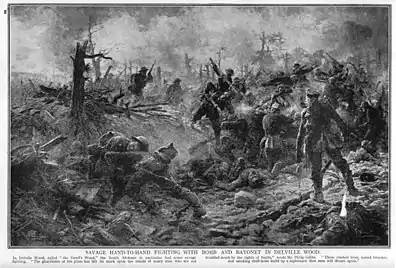
Fighting in Delville Wood
- Battle of Albert – The British captured Trônes Wood in France from the Germans at a cost of 3,837 men.[61] The same day, British, Indian and South African forces under command of General Henry Rawlinson began their assault of the German-held positions at Bazentin Ridge[62] and Delville Wood in France.[63]
- Baranovichi Offensive – The German Ninth Army launched counterattacks against Russia in Belarus and gained back nearly all the ground lost in previous assaults.[64]
- The National Protection War ended in China, with all rebelling Chinese provinces rescinding their independence.[65]
- A hurricane made landfall in North and South Carolina, causing heavy flooding that killed around 80 people and caused an estimated $15-$20 million in damages.[66]
- British submarine HMS H5 sank German U-boat SM U-51 with the loss of 34 of her crew (four survivors were rescued).[67]
- U.S. Navy collier USS Hector ran aground off the Atlantic coast and sank three days later, after all 142 crew members on board were rescued.[68]
- The Royal Flying Corps established the No. 41 Squadron with a nucleus of pilots from the 27 Reserve Squadron.[69]
- The King Edward Memorial Hospital for Women was established in Subiaco, Western Australia, Australia to handle pregnancy and infant care for female patients.[70]
- German poet Hugo Ball recited the first Dada manifesto at a public soiree in Waag Hall, Zürich.(see text).[71]
- Born: Natalia Ginzburg, Italian author, known for works such Family Sayings and Caro Michele, in Palermo, Italy (d. 1991); Sukarni, Indonesian politician, one of the major leaders of Indonesian independence, in Blitar, Dutch East Indies (d. 1971)
July 15, 1916 (Saturday)

Brigadier-General Henry Lukin, commander of the 1st South African Brigade.
- Battle of Delville Wood – The 1st South African Brigade under command of Brigadier-General Henry Lukin were ordered to take Delville Wood "at all cost",[72] resulting in South Africa sustaining its biggest loss of men in World War I when 766 soldiers in the brigade were killed a single day's fighting.[73]
- Battle of Verdun – The Germans gave up on taking Fort Souville and retreated to their start lines.[44]
- British submarine HMS H3 struck a mine and sank in the Adriatic Sea.[74]
- William E. Boeing founded the Pacific Aero Products Company in Seattle. It would be renamed the Boeing Airplane Company in 1917.[75]
- Ross Sea party – The surviving three members of the sledging party for the second arm of the Imperial Trans-Antarctic Expedition — Ernest Wild, brother to Frank Wild of the expedition party under Ernest Shackleton, Ernest Joyce and Richard W. Richards — reached Cape Evans where they reunited with the four scientists already stationed there. Three members of the party, including expedition leader Aeneas Mackintosh, perished during the sledging trek. The final seven remained marooned at the station in Cape Evans until rescue in January 1917.[76][77]
- The United States Army activated the 34th Infantry Regiment in El Paso, Texas.[78]
- The 1st Machine-Gun Squadron of New Zealand was formed to serve in the Sinai and Palestine campaign.[79]
- A partial lunar eclipse occurred over the Antarctica while stranded members of the Ross Sea party attempted to cross the sea ice to reach Cape Evans.[80]
- Born: Joseph M. Pettit, American academic, president of Georgia Tech from 1972 to 1986, in Rochester, Minnesota (d. 1986); Stan Sismey, Australian cricketer, batsman for the New South Wales cricket team from 1938 to 1952, in Junee, Australia (d. 2009)
- Died: Élie Metchnikoff, Russian microbiologist, recipient of the Nobel Prize in Physiology or Medicine for his discovery of phagocytes and cell-mediated immunity (b. 1845)
July 16, 1916 (Sunday)
- Battle of Delville Wood – Heavy casualties from two days fighting reduced the 1st South African Brigade's ability to take German defense positions, forcing them to retreat back to their lines at Longueval, France.[81]
- Much of the Southern Railway's mainline in North and South Carolina was damaged or destroyed by flooding.[82]
- The city of Blythe, California was established.[83]
- Born: Miles Copeland Jr., American intelligence agent, covert operator for the Middle East author of The Game Player: Confessions of the CIA's Original Political Operative, in Birmingham, Alabama (d. 1991); John Gallagher, Canadian oil executive, head of Dome Petroleum from 1950 to 1983, in Winnipeg (d. 1998)
- Born: Hubert Ogunde, Nigerian playwright, founder of the Ogunde Theatre Party, the first professional theatre company in the country, author of Yoruba Ronu, in Ososa, Ijebu Ode, Ogun State, Nigeria (d. 1990); Bill Carson, New Zealand cricket player, played for the New Zealand national cricket team from 1937 to 1939 and the Auckland cricket team from 1936 to 1940, in Gisborne, New Zealand (d. 1944)
- Died: Victor Horsley, British neurosurgeon, leading pioneer of neurosurgery including the co-developer of the Horsley–Clarke apparatus (b. 1857)
July 17, 1916 (Monday)
- Battle of Albert – The British captured all of Ovillers, France with 5,121 casualties.[84]
- Battle of Bazentin Ridge – British forces captured Bazentin Ridge from the Germans but at a loss of 9,194 casualties. [85]
- Battle of Delville Wood – Renewed British and South African attacks on the wood resulted in failure, allowing the Germans to launch nighttime counterattacks that forced most of the South African force from the forward trenches.[86][87]
- U.S. President Woodrow Wilson signed the Federal Farm Loan Act which allowed for the creation of farm loan boards at all three levels of government to financially assist American farmers.[88]
- Uruguay won the first Copa América association football continental championship after tying with host Argentina in the deciding last match held in Estadio Racing Club in Avellaneda, Argentina.[89]
- The Abraham Lincoln Birthplace National Historical Park was established in LaRue County, Kentucky.[90]
- Born: Henning Brandis, German physician, leading researcher in microbiology and contributor of the 1952 textbook Experimental Bacteriology, grandson of Dietrich Brandis, in Elberfeld, Germany (d. 2004)
- Died: Eugene B. Beaumont, American army officer, recipient of the Medal of Honor for action at the Battle of Selma (b. 1837)
July 18, 1916 (Tuesday)
- Battle of Delville Wood – Relief forces allowed South Africa to slow the German advance and retake some ground lost the day before. By now, fighting had leveled nearly the entire wood into "stumps" and "craters".[91]
- The French air force began having all the metals part of their Morane-Saulnier aircraft painted red to avoid confusion with German Fokker monoplanes, the first time markings were used to identify a type of aircraft.
- Born: L. Patrick Gray, American law enforcer, acting Director of the Federal Bureau of Investigation during the Watergate scandal, in St. Louis (d. 2005); Hugh John Beazley, British fighter pilot, recipient of the Distinguished Flying Cross for service for the Royal Air Force during World War II, in Cornwall, England (d. 2011); Horace S. Carswell Jr., American air force officer, recipient for the Medal of Honor for his service in Southeast Asia during World War II, in Fort Worth, Texas (d. 1944, killed in action)
- Died: Eric Milroy, Scottish rugby player, played for the Watsonians from 1906 to 1914 and for the Scotland national rugby union team from 1910 to 1914 (killed at the Battle of the Somme) (b. 1887)
July 19, 1916 (Wednesday)
- Attack at Fromelles – The first joint British and Australian operation commenced with General Richard Haking commanding 10,000 to 15,000 troops in an assault of a German defense force of 30,000 near Lille, France.[92]
- Battle of Delville Wood – German forces launched a rear attack on the 3rd South African Battalion, resulting in the capture of six officers and 185 men. The attacks also isolated more pockets of South African troops in the wood, forcing many to surrender over the day. [93]
- A city fire in Oulu, Finland destroyed four city blocks and left 200 people homeless.[94]
- The First Army of the Imperial German Army was reformed for the Battle of the Somme.[95]
- Famous Players Film Company and Jesse L. Lasky Feature Plays merged to form Famous Players-Lasky for movie distribution.[96]
- The Carl Eduard War Cross was established by German noble Charles Edward, the last reigning Duke of the House of Saxe-Coburg and Gotha. The award was to be presented for bravery or merit in combat regardless of rank but was only awarded 97 times before World War I ended, making it one of the rarest of the German WWI military decorations.[97]
- Born: Phil Cavarretta, American baseball player, played baseman and outfielder for the Chicago Cubs from 1934 to 1955, in Chicago (d. 2010); Bill Goldfinch, British air force pilot, best known for attempting to escape the German POW camp Oflag IV-C using a handmade glider, in Whitstable, England (d. 2007); James D. Ramage, American naval air force officer, leading developer of modern aircraft carrier operations including modeling to be nuclear-powered, recipient of the Navy Cross, in Waterloo, Iowa (d. 2012)
July 20, 1916 (Thursday)
- Attack at Fromelles – An attack by Australian and British troops was repulsed by the German army with heavy casualties. including the heaviest single-day casualties for Australia in World War I with 5,513 casualties out of 7,080 sustained overall.[92]
- Battle of Delville Wood – British relief forces were able to secure an escape route for the remaining 1st South African Brigade out of Delville Wood,[98] with total casualties numbered at 2,536 men.[99] At the same time, German forces repelled an attack by the French Sixth Army to recapture the village of Barleux, France, inflicting 2,000 casualties.[100]
- Attacks on High Wood – British forces pushed into a wood near the French commune of Bazentin to forestall any German counterattacks following the capture of Bazentin Ridge the day before.[101]
- Lake View Store, the first indoor shopping mall in the United States, opened in Duluth, Minnesota.[102]
- Born: Harold McMaster, American inventor, holder of over 100 patents including the McMaster rotary engine and tempered glass, in Perrysburg, Ohio (d. 2003)
- Died: Reinhard Sorge, German dramatist and poet, member of the German Expressionism movement, recipient of the Kleist Prize for his play The Beggar, killed at the Battle of the Somme (b. 1892); Herbert Bolt, Australian rugby player, played for the Newtown Bluebags from 1912 to 1915, killed in Fleurbaix, France (b. 1893); Billy Congreve, British soldier, recipient of the Victoria Cross, killed in Longueval, France (b. 1891)
July 21, 1916 (Friday)
- Battle of Delville Wood – The British launched a renewed offensive to take Delville Wood but were repelled by strong German defenses.[103]
- Attacks on High Wood – German artillery barrages stalled the British advance to the north end of the wood.[104]
- German flying ace Otto Parschau was mortally wounded by aircraft fire from British pilot John Oliver Andrews over Grévillers, France. Parschau was able to land his plane and rushed to hospital where he died from his wounds.[105]
- Born: Wilfred Cantwell Smith, Canadian academic, leading researcher in comparative religious studies, author of The Meaning and End of Religion, in Toronto (d. 2000)
July 22, 1916 (Saturday)
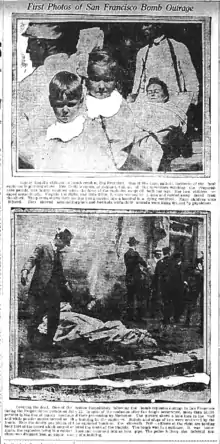
Newspaper photos of the victims killed or wounded during a parade bombing in San Francisco.
- A bomb exploded on Market Street during a Preparedness Day parade in San Francisco, killing 10 people and injuring another 40.[106] Labor leaders Warren Billings and Thomas Mooney were later wrongly convicted of the attack.[107]
- The first edition of "Der Kriegsbote" (The War Envoy) was published as a daily German-language newspaper for German South West Africa. It would eventually become Allgemeine Zeitung, the oldest-running newspaper of Namibia and the only German-language newspaper in Africa.[108]
- Born: Marcel Cerdan, French boxer, middleweight world champion in 1948, famous for his affair with Édith Piaf, in Sidi Bel Abbès, French Algeria (d. 1949, killed in a plane crash); William Harper, British-Rhodesian politician, founding member of the Rhodesian Front, cabinet member for the Winston Field and Ian Smith administrations, in Calcutta, British India (d. 2006); Ron Middleton, Australian fighter pilot, recipient of the Victoria Cross for action in Italy during World War II, in Sydney (d. 1942, killed in action)
- Died: James Whitcomb Riley, American poet, best known for his poems written for children including "Little Orphant Annie" and "The Raggedy Man" (b. 1849); John Pitcairn Jr., Scottish-American industrialist, founder of the Pittsburgh Plate Glass Company (now PPG Industries) (b. 1841); Edgar Albert Smith, British biologist, leading expert on mollusks and responsible for discovery of new species brought back from polar expeditions (b. 1847)
July 23, 1916 (Sunday)
- Battle of Pozières – The Australian 1st Division captured the French village of Pozières on the first day of the joint British-Australian offense against the Germans.[109][110] On the first day, Australian soldiers Arthur Blackburn[111] and John Leak[112] earned the Victoria Cross for their separate actions during the battle.
- Attacks on High Wood – British attacks to capture the entire wounded ended in failure, with 450 casualties.[113]
- Thousands attended an open-air meeting at the Phoenix Park in Dublin to discuss the British government's Irish partition proposals. It is the first open-air meeting since martial law was proclaimed during the Easter Rising.
- A peace demonstration organized by Scottish labor leader Helen Crawfurd was held in Glasgow with 5,000 in attendance. The event lead to further action and the formation of The Women's Peace Crusade.[114]
- Died: William Ramsay, Scottish chemist, recipient of the Nobel Prize in Chemistry for his discovery of noble gases (b. 1852)
July 24, 1916 (Monday)
- Battle of Pozières – Australian forces assaulted a second network of German trenches known as the O.G. Lines just east of Pozières, France.[115]
- Battle of Kowel – Austrian forces under command of Alexander von Linsingen counterattacked Russian forces south of the city of Kowel in what is now modern Ukraine in an attempt turn back the Brusilov Offensive launched in June.[116]
- Canadian rodeo cowboy Earl W. Bascom entered his first steer riding contest at Welling, Alberta and later becomes an international celebrity in the rodeo and fine art worlds. He was known as the first rodeo cowboy to become a professional cowboy artist and sculptor and the first cowboy artist to be honored as a Fellow of the Royal Society of Arts of London, England.[117]
- Born: Sandra Gould, American actress, best known for the role of Gladys Kravitz in Bewitched, in New York City (d. 1999); Sheila Florance, Australian actress, best known for her work with the Australian TV soap opera Prisoner, in St Kilda, Victoria, Australia (d. 1991); John D. MacDonald, American writer, best known for his thrillers including The Executioners, in which the film Cape Fear was based on, and the Travis McGee series, in Sharon, Pennsylvania (d. 1986)
- Born: Fred Hall, American politician, 33rd Governor of Kansas, in Dodge City, Kansas (d. 1970); Louis R. Lowery, American army officer and war photographer, photographed the first raising of the American flag on Iwo Jima (d. 1987)
July 25, 1916 (Tuesday)
- Battle of Erzincan – Russian forces smashed the Ottoman Third Army at Erzincan, Turkey. killing or capturing 34,000 Ottoman troops and rendering the army unfit for combat to the rest of year.[118][119]
- Baranovichi Offensive – Russia launched a fourth and final assault against the Germans.[120]
- Battle of Pozières – The Australian 1st Division was caught between friendly and offensive fire in Pozières, resulting in 5,285 casualties.[121] One of the casualties was Thomas Cooke, who as awarded posthumously the Victoria Cross for his brave actions during the first days of the battle.[122]
- The North of Scotland Special Military Area declared, restricting access by non-residents to everywhere north of the Great Glen in Scotland. Other areas in Great Britain designated for restricted travel later in the year included Isle of Sheppey (7 September), Newhaven, East Sussex (22 September), Harwich (27 September), Dover (6 October) and Spurn.[123]
- Born: Fred Lasswell, American cartoonist, known for his comic strip Barney Google and Snuffy Smith, in Kennett, Missouri (d. 2001); Thomas Leighton Decker, Sierra Leonean linguist, known for his research and advocate for the Krio language of Sierra Leone, in Calabar, Nigeria (d. 1978)
- Died: Henry Hildyard, British army officer, General Officer Commanding-in-Chief of South Africa from 1905 to 1908 (b. 1846); Sarah Broom Macnaughtan, Scottish writer, wrote accounts of the Armenian Genocide while with the Red Cross (b. 1864); Maria Alexandrovna Ulyanova, Russian matriarch, mother to Vladimir Lenin (b. 1835)
July 26, 1916 (Wednesday)
- Battle for Lake Tanganyika – With German colonial forces losing ground on land and likely risking the loss of the German-controlled lake port of Kigoma, General Paul von Lettow-Vorbeck ordered marine engineers to scuttle the steamship Graf von Goetzen. The loss of the last of three German ships built to control Lake Tanganyika in Central Africa allowed the Allies control of the largest body of water in continent.[124]
- Roger Casement was found guilty of high treason for this role in the Easter Rising and sentenced for execution on August 3.[125]
- The New South Wales Rugby Football League premiership culminated in a grand final victory to the Balmain Tigers.[126]
- The Woodman Institute Museum was opened in Dover, New Hampshire, and was listed on the National Register of Historic Places in 1980 [127]
- Died: Henry Charlick, Australian chess player, winner of the Australian Chess Championship in 1887 (b. 1845)
July 27, 1916 (Thursday)
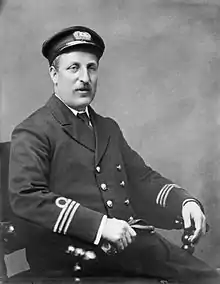
Captain Charles Fryatt, executed by the Imperial German Navy.
- Battle of Delville Wood – A massive artillery barrage by the British destroyed much of the German defenses in Delville Wood, with patrols describing "a horrible scene of chaos and destruction". Despite horrific losses, German forces recovered and launched a counter-assault on the eastern side of the wood.[128]
- Battle of Pozières – The Australian 2nd Division relieved Australian 1st Division to push for further attacks on the German line.[115]
- English civilian ferry captain Charles Fryatt was executed at Bruges, Belgium after a German court-martial condemned him for attempting to ram a U-boat in 1915.[129]
- Maharaja Wadiyar presided over the opening of the University of Mysore, the sixth oldest university in India.[130]
- Born: Amha Selassie, Ethiopian state leader, last Emperor of Ethiopia, in Harar, Ethiopian Empire (d. 1997); Elizabeth Hardwick, American literary critic and novelist, co-founder of The New York Review of Books, in Lexington, Kentucky (d. 2007)
- Born: Keenan Wynn, American actor, for his character supporting roles in films such as Annie Get Your Gun and The Man in the Gray Flannel Suit, in New York City (d. 1986); Rosemary Brown, British composer and spiritualist, purported to have been able to channel the spirits of deceased composers such as Franz Liszt to produce new compositions, in London (d. 2001)
- Died: Daniel Bliss, American missionary, founder of the Syria Protestant College (now the American University of Beirut) (b. 1823)
July 28, 1916 (Friday)
- Battle of Pozières – Australian forces failed to make any gains on the German lines due to intense artillery and machine gun fire.[115]
- Brusilov Offensive – After stalling by weakened attacks around Kowel, Russian general Aleksei Brusilov order a renewed advance to push the Central Powers line back out of Galicia (now Ukraine).[131]
- Austrian composer Arnold Schoenberg completed the fourth orchestral composition of his Four Orchestral Songs that he began in 1913, although they would not be performed publicly until 1932.[132]
- Born: David Brown, American film and stage producer, known producing Hollywood hits such as The Sting, The Verdict and Driving Miss Daisy, in New York City (d. 2010); Rosina Raisbeck, Australian opera singer, best known for her performances through The Royal Opera, in Ballarat, Victoria, Australia (d. 2006); Harry Ashmore, American journalist, recipient of the Pulitzer Prize for his editorials on school racial integration in Arkansas for the Arkansas Gazette, in Greenville, South Carolina (d. 1998)
- Died: Fanny Ronalds, American socialite, known for her long affair with composer Arthur Sullivan and influence on his composition "The Lost Chord" (b. 1839)
July 29, 1916 (Saturday)
- Baranovichi Offensive – The Russian offensive ended in failure with no new ground recovered, with Russian Fourth Army sustaining 80,000 casualties. The opposing German Ninth Army only lost 13,000 casualties.[133]
- Matheson Fire – A lightning strike ignited a forest fire northwest of North Bay, Ontario that destroyed the towns of Cochrane and Matheson, Ontario, killing 233 people.[134][135]
- Claud Castleton was killed in the Battle of Pozières and for his actions in bringing back wounded men before and at the time of his death, he was awarded the Victoria Cross.[136]
- Born: Charlie Christian, American jazz musician, best known for his recordings collected for the album Solo Flight: The Genius of Charlie Christian, in Bonham, Texas (d. 1942); Budd Boetticher, American film director, best known for his Westerns starring Randolph Scott including Comanche Station, in Chicago (d. 2001)
- Born: Robert Guthrie, American biologist, developed screening technique for phenylketonuria in infants to prevent neurological damage, in Marionville, Missouri (d. 1995); Rupert Hamer, Australian politician, 39th Premier of Victoria, in Melbourne (d. 2004)
- Died: Eleanor Vere Boyle, English illustrator, best known for her illustrations for children's authors and her illustration collections including Child's Play and A Book of the Heavenly Birthdays (b. 1825)
July 30, 1916 (Sunday)
- A revolt of Turkic peoples in Central Asia, including members of the Kyrgyz and Kazakhs, against the Russian Empire at Bedel Pass near the Russian-Chinese international border resulted in at least 3,000 deaths[137] (although some estimates pegged the toll higher at 100,000) and forced tens of thousands to flee into China.[138]
- Battle of Delville Wood – British launched new attacks on the western side of Delville Wood but neither side was able to gain control of the area. A moratorium on major attacks was called that lasted five days.[139]
- German agents destroyed an ammunition depot, known as the Black Tom explosion, in Jersey City, New Jersey that killed at least seven people.[140]
- A solar eclipse occurred over the Antarctic.[141]
- Born: Thyra Thomson, American politician, 16th Secretary of State of Wyoming, in Florence, Colorado (d. 2013)
- Died: Albert Ludwig Sigesmund Neisser, German physician, discovered the bacteria that causes gonorrhea (b. 1855)
July 31, 1916 (Monday)
- Battle of the Somme – After a month's fighting, German losses increased to c. 160,000 while Anglo-French casualties were more than 200,000 men.[142]
- Born: Herbert Goodfellow, English rugby player, played halfback for Yorkshire during the Rugby League War of the Roses from 1938 to 1946 and the England national rugby league team in 1939, in Sharlston, England (d. 1997); Brian Inglis, Irish journalist, best known as the news presenter for TV news program All Our Yesterdays, in Dublin (d. 1993)
- Born: Mohan Lal Sukhadia, Indian politician, 5th Chief Minister of Rajasthan, in Jhalawar, India (d. 1982); Bill Todman, American television producer, partner to Mark Goodson on producing TV game shows Family Feud and The Price Is Right, in New York City (d. 1979); Ethel Wilson Gammon, American educator, founder of the Washburn-Norlands Living History Center, in Augusta, Maine (d. 2009)
References
- Edmonds, J. E. (1993) [1932]. Military Operations France and Belgium, 1916: Sir Douglas Haig's Command to the 1st July: Battle of the Somme. History of the Great War Based on Official Documents by Direction of the Historical Section of the Committee of Imperial Defence. I (Imperial War Museum & Battery Press ed.). London: Macmillan. pp. 344–345. ISBN 0-89839-185-7.
- Sheldon, J. (2006) [2005]. The German Army on the Somme 1914–1916 (Pen & Sword Military ed.). London: Leo Cooper. p. 162. ISBN 1-84415-269-3.
- Philpott, W. (2009). Bloody Victory: The Sacrifice on the Somme and the Making of the Twentieth Century (1st ed.). London: Little, Brown. pp. 187–188. ISBN 978-1-4087-0108-9.
- Sheffield, Gary (2003). The Somme. Cassell. p. 68. ISBN 0-304-36649-8.
- "Parades and Marches - Chronology 2: Historical Dates and Events". Conflict Archive on the Internet (CAIN). Retrieved 28 January 2010.
- Higonnet, Margaret R. (1999). Lines of fire: women writers of World War I. Plume. p. 174. ISBN 978-0-452-28146-2.
- Middlebrook, M. (1971). The First Day on the Somme. London: Penguin Books. p. 329. ISBN 978-0-14-139071-0.
- "Poets Killed on the First Day of the Somme". Poetry of the First World War. Archived from the original on 2011-05-22. Retrieved 2013-05-21.
- Booth’s Obituary in the 1917 John Wisden’s Cricketers’ Almanac
- Cowdery, Rick & Curno, Mike (2009). Plymouth Argyle: Miscellany. Durrington: Pitch Publishing. p. 64. ISBN 978-1-905411-40-5.
- Jones, Simon (2010). Underground Warfare 1914-1918. Barnsley: Pen & Sword Books. pp. 115, 131. ISBN 978-1-84415-962-8.
- Seppo Zetterberg et al (2003) A Small Giant of the Finnish History. Werner Söderström Osakeyhtiö.
- Allan Tiitta and Seppo Zetterberg (1992) Finland Through the Ages. Reader's Digest.
- Fernicola, Twelve Days of Terror, pp. 1–9; Capuzzo, Close to Shore, pp. 88–103; Thomas B. Allen, Shadows in the Sea: The Sharks, Skates, and Rays, (1963; Guilford, Conn.: The Lyons Press, 1996), pp. 3–4, ISBN 1-55821-518-2.
- "Majority For Liquor Act In Neighborhood of 20,000". 22nd Year No. 3867. The Calgary Daily Herald. July 22, 1915. p. 1.
- "17th Cavalry Regimental History". Archived from the original on 15 February 2007.
- Zoological Survey of India-History and Progress 1916-1990 (1990). Edited by Director, Zoological Survey of India. Published by ZSI, Kolkata.109pp.
- Mann, Neil. "An Overview of A Vision". "The System of W. B. Yeats's A Vision". Retrieved on 15 July 2007.
- Jukvam, Dag (1999). "Historisk oversikt over endringer i kommune- og fylkesinndelingen" (PDF) (in Norwegian). Statistisk sentralbyrå.
- "Corporate Information". Auto-Owners Insurance Company. Retrieved 2010-08-30.
- Miles, W. (1992) [1938]. Military Operations France and Belgium, 1916: 2nd July 1916 to the End of the Battles of the Somme. History of the Great War Based on Official Documents by Direction of the Historical Section of the Committee of Imperial Defence. II (Imperial War Museum & Battery Press ed.). London: Macmillan. pp. 5–6. ISBN 0-901627-76-3.
- Hilliard Atteridge, A. (2003) [1929]. History of the 17th (Northern) Division (Naval & Military Press ed.). London: R. Maclehose. p. 110. ISBN 1-843-42581-5.
- Edmonds 1932, p.344
- A Global Chronology of Conflict, Volume Four, ed. Spencer C. Tucker, (ABC-CLIO, 2010), p. 1625
- Залесский К. А. Кто был кто в Первой мировой войне. — М:Астрель. АСТ, 2003. — p. 699.
- Miles 1938, pp. 12–13.
- Musicant, Ivan (1990). The Banana Wars. New York: Macmillan Publishing Co. pp. 253–263. ISBN 0025882104.
- Tucker 2010, p. 117
- Matuszak, Tomasz (June 17, 2006). "Bitwa pod Kostiuchnówką". Zwycięstwa Oręża Polskiego (in Polish). Rzeczpospolita and Mówią Wieki (16): 5–12.
- http://www.in.gov/dnr/3245.htm Official (Indiana) DNR Historical Timeline
- Jason Fagone (2007). Horsemen of the Esophagus: Competitive Eating and the Big Fat American Dream. Crown/Archetype (p. 215). ISBN 9780307347152.
- Hurricane Research Division. "HURDAT Meta-Data". NOAA. Archived from the original on 16 March 2008. Retrieved February 15, 2008.
- Shinano Mainichi Shimbun (2011). Nagano Prefecture All Railway Stations, revised edition (長野県鉄道全駅 増補改訂版) (in Japanese). Shinano Mainichi Shinbun Publishing. p. 110. ISBN 9784784071647.
- Miles 1938, pp. 21-22.
- Matuszak, 2006 p. 12
- Royal Naval Submarine Museum. Submarine losses 1904 to present day. p.6
- "A Brief History of the 33rd Infantry Regiment" (PDF). CZ Images. 33rd Infantry Regiment Combat Team. Retrieved 9 November 2016.
- "U 77". Uboat.net. Retrieved 20 October 2012.
- "Today in History". New Zealand Ministry for Culture and Heritage. Retrieved 19 September 2008.
- "A Brief History of the WSPUS," The Western Socialist, July 1966
- Залесский 2003, p. 699
- П.Г.Усенко (P.G.Usenko), IСТОРIЇ ВЕЛИКОЇ ВIЙНИ 1914–1917 рр. НА ЧОРНОМУ МОРI (From the history of the Great War of the 1914-1917 on the Black Sea). Page 80. (in Ukrainian)
- Doughty 2005, p. 298.
- Holstein 2002, pp. 94–95.
- Murphy, David (2008). The Arab Revolt 1916–18 Lawrence sets Arabia Ablaze. London: Osprey. p. 35. ISBN 978-1-84603-339-1.
- "Effort Made to Kill President of Argentine". The Gazette Times. 10 July 1916.
- "Eugenio Figueredo will attend the tribute to Héctor Rivadavia Gómez". conmebol.com.
- Miles 1938, pp. 57-58.
- Weingroff, Richard F. (Summer 1996). "Federal Aid Road Act of 1916: Building The Foundation". Public Roads. Federal Highway Administration. 60 (1). Retrieved August 25, 2015.
- "Location and History Profile: Town of Milk River" (PDF). Alberta Municipal Affairs. October 7, 2016. p. 400. Retrieved October 16, 2016.
- Miles 1938, pp. 52–54.
- Layman, R.D., Before the Aircraft Carrier: The Development of Aviation Vessels 1849–1922, Annapolis, Maryland: Naval Institute Press, 1989, ISBN 0-87021-210-9, p. 113.
- Shackleton, Ernest (1983). South. London: Century Publishing. pp. 214–18. ISBN 0-7126-0111-2.
- (in Italian) XXIV Legislatura del Regno d'Italia dal 27 novembre 1913 al 29 settembre 1919, Camera dei deputati, Portale storico (retrieved 29 May 2016)
- Bud Collins (2010). The Bud Collins History of Tennis (2nd ed.). [New York]: New Chapter Press. pp. 454–483. ISBN 978-0942257700.
- Cross, Barry; Hofmann, Pierre (April 1994). "Nyon – St. Cergue – Morez: An international light rail line". Light Rail & Modern Tramway. UK: Ian Allan Publishing. pp. 87–93. ISSN 0964-9255.
- Philpott 2009, p. 237.
- Sheffield 2003, p. 76.
- Edmonds 1932, pp. 483–484.
- Rendel, David (1975) Civil Aviation in New Zealand: An Illustrated History. Wellington. A.H. & A.W.Reed. ISBN 0-589-00905-2
- Miles 1938, pp. 75–78.
- Miles 1992, pp. 78–79.
- Philpott 2009, pp. 255–260.
- Залесский 2003, p. 699
- Weale, Putnam; Lenox, Bertram (1917). "The fight for the republic in China". Dodd, Mead and Company: 490. OCLC 1541271. Cite journal requires
|journal=(help) - Western North Carolina Heritage. ASHEVILLE FLOOD of 1916. Archived 2008-08-19 at the Wayback Machine Retrieved on June 23, 2008.
- National Archives, Kew: HW 7/3, Room 40, History of German Naval Warfare 1914–1918
- "Imperial and Foreign news items". The Times (41221). London. 17 July 1916. col E, p. 7.
- "41(R) Squadron". Royal Air Force. Retrieved 11 February 2016.
- Cohen, B.C.; Hutchison, R.L. (1966). A history of the King Edward Memorial Hospital for Women : the first fifty years, 1916 to 1966. Subiaco, Western Australia: King Edward Memorial Hospital.
- Motherwell, Robert (1951). The Dada painters and poets; an anthology. New York: Wittenborn, Schultz. OCLC 1906000.
- Buchan, J. (1992) [1920]. The History of the South African Forces in France (Imperial War Museum and Battery Press ed.). London: Nelson. pp. 59–63. ISBN 0-901627-89-5. Retrieved 28 July 2014.
- Miles 1992, pp. 92–97.
- Derek Walters (2004). The History of the British 'U' Class Submarine. Casemate Publishers. p. 2. ISBN 978-1-84415-131-8.
- Angelucci, Enzo, The American Fighter: The Definitive Guide to American Fighter Aircraft From 1917 to the Present, New York: Orion Books, 1987, p. 63.
- Bickel, Lennard (2001). 'Shackleton's Forgotten Men: The Untold Tale of an Antarctic Tragedy. London: Pimlico Press. pp. 204–13. ISBN 0-7126-6807-1.
- Tyler-Lewis, Kelly (2007). The Lost Men. London: Bloomsbury Publications. pp. 193–197. ISBN 978-0-7475-7972-4.
- "Special Unit Designations". United States Army Center of Military History. 21 April 2010. Archived from the original on 9 June 2010. Retrieved 24 June 2010.
- Luxford, J H (1923). With the Machine Gunners in France and Palestine. Auckland: Whitcombe and Tombs. pp. 178–79. ISBN 1843426773.
- Richard McElrea; David L. Harrowfield (2004). Polar castaways: the Ross Sea Party (1914–17) of Sir Ernest Shackleton. Canterbury University Press. p. 206.
- Uys, I. (1983). Delville Wood. Johannesburg: Uys Publishers. pp. 103–104. ISBN 0-620-06611-3.
- Southern Railway Historical Association. "This Date in Southern Railway History". Retrieved 2005-07-12.
- "California Cities by Incorporation Date". California Association of Local Agency Formation Commissions. Archived from the original (Word) on November 3, 2014. Retrieved August 25, 2014.
- Miles 1938, pp. 101.
- Miles 1992, pp. 93–94.
- Buchan 1920, pp. 64–75.
- Uys 1983, p. 135.
- Shulman, Stuart W. (2003). Adams, Jane (ed.). "The Origin of the Federal Farm Loan Act: Issue Emergence and Agenda‐Setting in the Progressive Era Print Press". Fighting for the Farm: Rural America Transformed. University of Pennsylvania Press: 113‐128.
- "Copa América: History". CONMEBOL. Retrieved 27 February 2015.
- Robert W., Blythe; Maureen Carrol; Steven Moffson (July 2001). "Abraham Lincoln Birthplace National Historic Site: Historic Resource Study" (PDF). National Park Service. Retrieved 2008-02-13.
- Uys 1983, pp. 204-205.
- Miles 1938, pp. 128-130.
- Uys 1991, p. 102.
- Suikkari, Risto (2007). Paloturvallisuus ja kaupunkipalot Suomen puukaupungeissa – historiasta nykypäivään [Fire safety and urban fires in Finland’s capitals from history to today] (PDF) (in Finnish). Oulu: University of Oulu. pp. 54–57. ISBN 978-951-42-8699-5. Retrieved March 3, 2008.
- Cron, Hermann (2002). Imperial German Army 1914–18: Organisation, Structure, Orders-of-Battle [first published: 1937]. Helion & Co. p. 79. ISBN 1-874622-70-1.
- Bernard F. Dick. Engulfed: The Death of Paramount Pictures and the Birth of Corporate Hollywood (Lexington: The University Press of Kentucky, 2001) pp.10-18
- "Saxe-Coburg-Gotha Carl Eduard War Cross | Australian War Memorial". Awm.gov.au. Retrieved 15 May 2013.
- Uys 1991, p. 117.
- Miles 1938, p. 108.
- Philpott 2009, pp. 255-256
- Jones, H. A. (2002) [1928]. The War in the Air, Being the Story of the Part Played in the Great War by the Royal Air Force. II (Imperial War Museum and Naval & Military Press ed.). London: Clarendon Press. p. 238. ISBN 1-84342-413-4. Retrieved 20 September 2014.
- Duluth News Tribune (January 4, 1916, July 19, 1916, July 20, 1916, July 21, 1916); The Minnesotan (November 1916); American Architect Vol. 113 (June 1918); Morgan Park Bulletin Vol. 2 No. 26 (April 24, 1919); Duluth Herald (September 20, 1929); Minneapolis Star Tribune (02-28-1972); Duluth Sketches of the Past (1976), Arnold Alanen; Morgan Park Continuity And Change In A Company Town (1992), Anedith Nash & Robert Silberman
- Miles 1938, p. 141.
- McCarthy, C. (2005) [1993]. The Somme: The Day-by-Day Account (Arms & Armour Press ed.). London: Weidenfeld Military. p. 54. ISBN 1-85409-330-4.
- Above the Lines: The Aces and Fighter Units of the German Air Service, Naval Air Service and Flanders Marine Corps 1914 - 1918. p. 138.
- Bomb Hurled Through Air Says Physician Who Was Witness to Saturday Outrage, Reno Evening Gazette, 24 July 1916, pp. 1-2
- Frost, Richard H., The Mooney Case, Stanford University Press, ISBN 0-8047-0651-4, ISBN 978-0-8047-0651-3 (1968), pp. 106-108, 112-118
- Hartman, Adam (December 8, 2008). "Namibia: Namib Times Celebrates 50 Years". AllAfrica Global Media. Retrieved December 16, 2008.
- Keegan, J. (1998). The First World War. London: Random House. p. 319. ISBN 0-09-180178-8.
- Liddle, P. H. (2001). The 1916 Battle of the Somme: A Reappraisal. Hertfordshire: Wordsworth. pp. 78–79. ISBN 1-84022-240-9.
- "No. 29740". The London Gazette (Supplement). 8 September 1916. p. 8870.
- "No. 29740". The London Gazette (Supplement). 8 September 1916. pp. 8869–8871.
- McCarthy 1993, pp. 56–57.
- Liddington, Jill (1984). The Life and Times of a Respectable Rebel: Selina Cooper (1864 – 1946). Virago.
- Liddle 2001, p. 78.
- Lanning, Michael Lee (2003). The Battle 100: the stories behind history's most influential battles. p. 297. ISBN 1-4022-0263-6.
- ProRodeo Sports News "Bascom dies at 89" (September 13, 1995)
- Tucker 2010, p. 1625
- David Eggenberger, An Encyclopedia of Battles: Accounts of Over 1,560 Battles from 1479 b.c. to the Present, (Courier Dover Publications, 1985), p. 137.
- Залесский 2003, p. 699
- Bean, C. E. W. (1941) [1929]. The Australian Imperial Force in France: 1916. Official History of Australia in the War of 1914–1918. III (12th ed.). p. 599. OCLC 271462387. Retrieved 5 August 2013.
- "No. 29740". The London Gazette (Supplement). 9 September 1916. p. 8870.
- "Wartime Travel Restriction". Glenmoriston. Retrieved 2015-08-12.
- Leconte: Les ancêtres de notre Force Navale. S. 331; Moulaert: La campagne du Tanganika. S. 119
- Andrews, Helen (2011-11-15). "Roger Casement: The Gay Irish Humanitarian Who Was Hanged On a Comma | Helen Andrews". First Things. Retrieved 2016-08-17.
- Premiership Roll of Honour Archived 2006-05-11 at the Wayback Machine at rl1908.com
- "NRHP nomination for Woodman Institute". National Park Service. Retrieved 2014-08-04.
- Miles 1938, pp. 158-159.
- "Captain Charles Fryatt". Great War Primary Documents Archive. Retrieved 8 December 2009.
- "About UOM". University of Mysore. University of Mysore. Retrieved 5 November 2016.
- Keegan John, (2000). The First World War. p. 306
- "Vier Lieder für Gesang und Orchester [For songs for voice and orchestra] op. 22". www.schoenberg.at. Retrieved 28 April 2014.
- Залесский 2003, p. 699
- Martin E. Alexander, "'Lest we forget': Canada's major wildland fire disasters of the past, 1825-1938" (PDF), Proceedings of 3rd Fire Behavior and Fuels Conference, October 25-29, 2010, Spokane, Washington, USA, retrieved 2016-05-14
- Ontario Heritage Foundation, The Great Fire of 1916 (PDF), archived from the original (PDF) on 2016-03-04, retrieved 2016-05-14
- "No. 29765". The London Gazette (Supplement). 22 June 1915. p. 9418.
- Krugosvet Encyclopaedia. Article on Sturmer Archived 2007-11-11 at the Wayback Machine
- Bruce Pannier (2 August 2006). "Kyrgyzstan: Victims Of 1916 'Urkun' Tragedy Commemorated". RFE/RL. Retrieved 2006-08-02.
- Miles 1938, pp. 167, 170.
- "Black Tom Explosion (1916)". state.nj.gov. January 26, 2005. Retrieved July 5, 2009.
- "Annular Solar Eclipse of 1916 Jul 30". Eclipse Predictions by Fred Espenak, NASA/GSFC. NASA. Retrieved 24 December 2016.
- Keegan 1998, p. 319.
This article is issued from Wikipedia. The text is licensed under Creative Commons - Attribution - Sharealike. Additional terms may apply for the media files.
